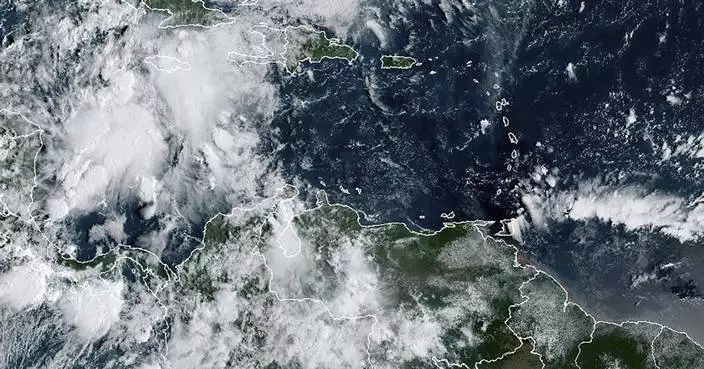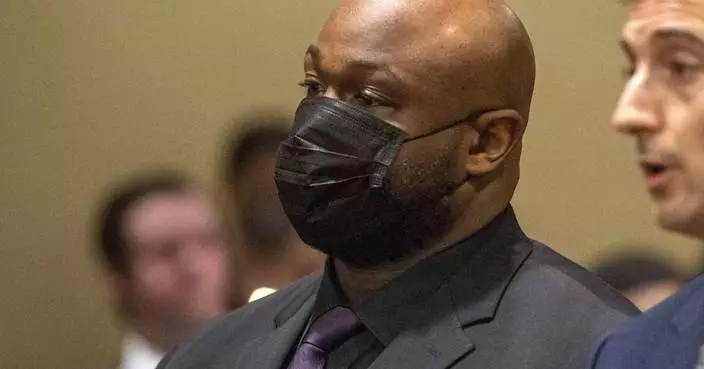In Georgia, election workers will have to hand count the number of ballots cast after voting is completed. In North Carolina, some students and university staff can use their digital IDs to vote. In Wisconsin, ballot drop boxes are newly legal again, although not every voting jurisdiction will use them.
Across the country, including in some of the nation’s presidential swing states, new or recently altered state laws are changing how Americans will vote, tally ballots, and administer and certify November’s election.
It can be a challenge to keep track of these 11th-hour changes, especially since state election processes already vary so widely. Even more changes are looming in some states, with Election Day on Nov. 5 now just weeks away. Several states already have started sending out mail ballots, and in some states, voters have begun casting ballots in person.
“Last-minute changes to election rules — whether from a state legislature, an election authority or a court — can lead to confusion for voters and election officials," Megan Bellamy, vice president of law and policy for the Voting Rights Lab, said in an email response. "Election season is underway. Lawmakers, administrative bodies and courts must recognize that.”
Here's a look at some of the election processes that are new or have been recently modified.
Georgia and Arizona will both require election workers to do hand counts at polling sites on Election Day. Election officials say it could delay the reporting of results.
The Georgia State Election Board passed its new rule on Friday. It requires that the number of ballots — not the number of votes — be counted by hand at each polling place by three separate poll workers until all three counts are the same.
Georgia voters make selections on touch-screen voting machines that print out paper ballots. Those ballots include a list of the selections so voters can verify their accuracy and a QR code that is read by a scanner to tally the votes.
Proponents say the new hand-count rule is needed to make sure the number of paper ballots matches the electronic tallies on scanners, check-in computers and voting machines. The three workers will have to count the ballots in piles of 50, and the poll manager needs to explain and fix, if possible, any discrepancies, as well as document them.
The rule goes against the advice of the state attorney general’s office, the secretary of state’s office and an association of county election officials. Critics worry it could delay the reporting of election night results, undermining public confidence in the process.
A similar change to state law this year in Arizona is also likely to cause delayed results in the swing state this fall. It requires counties to hand count ballot envelopes that are dropped off at polling centers on Election Day before the ballots are tabulated.
After the July primary, Maricopa County Elections spokesperson Jennifer Liewer said the new step resulted in a roughly 30-minute delay in reporting the county's results, and said the impact could be greater in the general election “if we have hundreds of thousands of ballots dropped off.”
Maricopa County, which includes Phoenix, estimates between 378,000 and 504,000 voters will drop off their ballots on Nov. 5.
JP Martin, a spokesperson for Arizona Secretary of State Adrian Fontes, a Democrat, said in an email that the mandate to count ballot envelopes will “require considerable time, particularly since poll workers have already completed a 12-15-hour shift.”
Chaos and disinformation about mail-in ballots and drop boxes have prompted partisan disagreements — and new rules — in several states over how these accessible voting methods should be used.
In Wisconsin, the then-conservative majority state Supreme Court outlawed drop boxes in 2022. But a new liberal majority on the court made them legal again in July. Some communities opened them for the state’s August primary, but more will be in use for November.
Their use in Wisconsin is voluntary and some conservative towns have opted against using drop boxes, citing security concerns. The state’s two most heavily Democratic cities, Milwaukee and Madison, used them in August and will again in November.
Ohio Secretary of State Frank LaRose, a Republican, issued a directive to county election boards in August that said only a voter can drop their personal ballot in a drop box. Anyone who assists someone else must return that ballot inside the county board office and complete an attestation form.
In Pennsylvania, a court battle is pending at the state Supreme Court that could decide whether counties must count provisional ballots cast by voters whose mail-in ballots were rejected for relatively minor mistakes, such as not inserting the ballot into an inner secrecy envelope. Practices vary by county and state law is silent on it. Republicans have argued that nothing in state law explicitly allows a voter to cast a provisional ballot in place of a rejected mail-in ballot.
Separately, the Pennsylvania state Supreme Court earlier this month threw out a case on a technicality after a lower court had ruled that rejecting mail-in ballots for “meaningless and inconsequential paperwork errors” — such as a missing handwritten date — violates the constitutional right to vote. As a result, counties are expected to continue the practice of disqualifying those ballots. Some counties — primarily Democratic ones — strive to help voters fix those errors or cast a provisional ballot instead.
This is the first presidential election since Florida's Republican-controlled Legislature made a series of changes to mail balloting in 2021. While those aren't recent changes, their impact could be significant this year in a state that traditionally has had robust interest in voting by mail. One change makes a voter's request for a mail ballot valid only for the next general election, rather than two general election cycles, meaning voters will have to reapply. Requesting a mail ballot also now requires a driver's license number, state ID number or last four digits of a Social Security number.
In North Carolina, the State Board of Elections last month voted that students and staff at the University of North Carolina at Chapel Hill could show digital identifications on their smartphones to qualify to vote under the state’s recently implemented photo voter ID law.
It marked the first such digital ID the board has approved. Republican groups sued, contending that state law only allows physical cards.
A trial judge last week refused to block its use. Republicans have since filed an appeal notice. Only mobile IDs issued by UNC-Chapel Hill on Apple phones have been approved for use.
In Arkansas, a federal appeals court decision last week reinstated a rule that bans electronic signatures for voter registration. The state Board of Election Commissioners approved the rule in April, saying the state’s constitution allows only certain agencies, and not elections officials, to accept electronic signatures. Under the rule, voters will have to register by signing their name with a pen.
It was adopted after nonprofit group Get Loud Arkansas helped register voters using electronic signatures. The board said the rule was needed to create uniformity across the state.
The board’s director asked county clerks to identify any registration documents submitted using electronic signatures after the appeals court decision and make every effort to contact the voters as soon as possible to give them the chance to correct their application.
Election administration doesn't stop when the polls close, and a few states will have new processes in the post-election period.
The same Georgia election board that ordered counties to hand count the number of paper ballots had just weeks earlier passed new rules related to certification of the vote. One change provides for a “reasonable inquiry” before county election officials certify results, without defining what that means. Another allows county election officials “to examine all election-related documentation created during the conduct of elections.”
Democrats have sued to block the new rules, saying they could be used by local officials who want to refuse certification if they don't like the election results.
In New Hampshire, Gov. Chris Sununu signed legislation in July that establishes postelection audits. It took effect in time for New Hampshire’s late state primary on Sept. 10 and will apply to general elections.
The audits allow the secretary of state’s office to check that electronic vote-counting equipment functioned properly. Ten polling locations were chosen at random.
The audit of electronic ballot counting devices was determined successful by the appointed audit team, with all results within expected margins.
In Nebraska, former President Donald Trump's allies were pushing for the state to change how it allocates electoral votes to prevent Vice President Kamala Harris from potentially claiming one of them by carrying the state’s congressional district for the Omaha area. But that effort appears doomed because a Republican state senator said he wouldn’t support it, denying backers the two-thirds majority they would need to get it through the Legislature and into law before the Nov. 5 election.
“After deep consideration, it is clear to me that right now, 43 days from Election Day, is not the moment to make this change,” state Sen. Mike McDonnell of Omaha said Monday.
Maine is the only other state that allocates Electoral College votes by congressional district.
Associated Press statehouse reporters across the country contributed to this report.
The Associated Press receives support from several private foundations to enhance its explanatory coverage of elections and democracy. See more about AP’s democracy initiative here. The AP is solely responsible for all content.
In a story published Sept. 24, 2024, about state election rules, The Associated Press erroneously reported the number of mailed ballots expected to be dropped off at voting locations in Maricopa County, Arizona, on Election Day. The number estimated is between 378,000 and 504,000, not between 625,000 and 730,000.
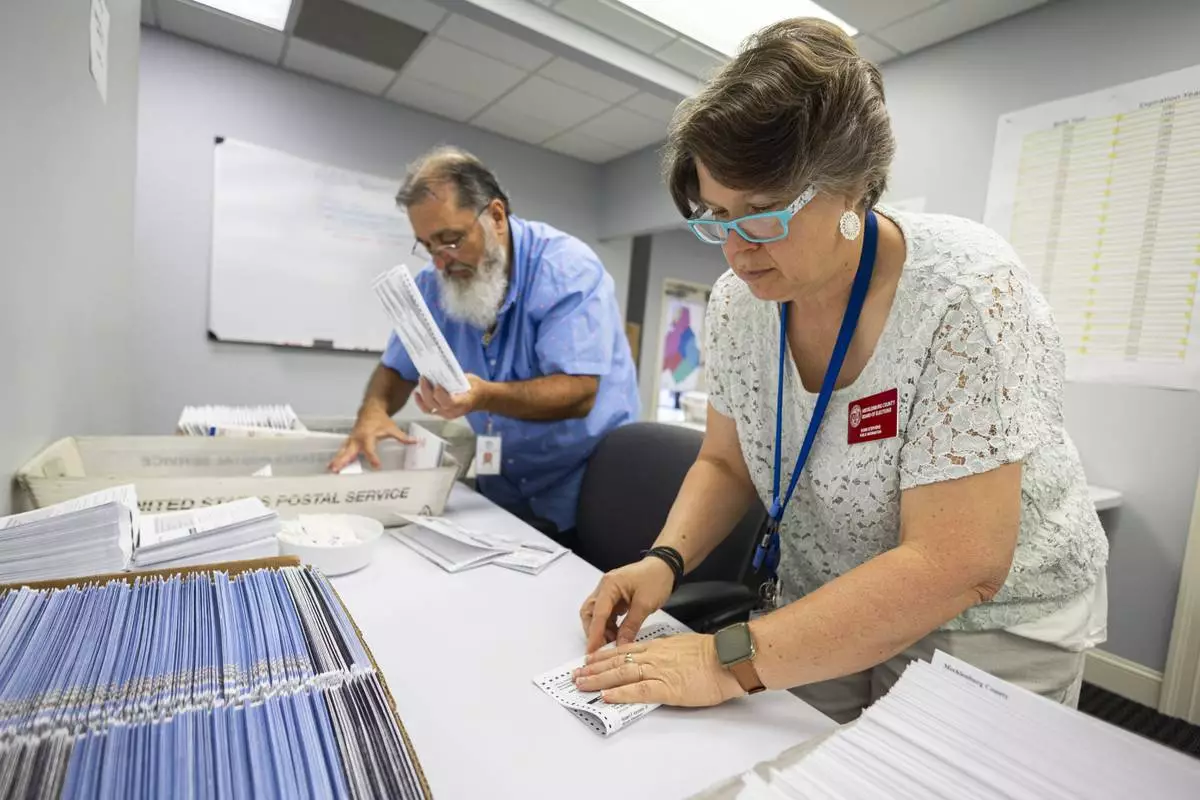
FILE - Dawn Stephens, right, and Duane Taylor prepare ballots to be mailed at the Mecklenburg County Board of Elections in Charlotte, N.C., Sept. 5, 2024. (AP Photo/Nell Redmond)
BEIRUT (AP) — The Israeli military said it killed a top Hezbollah commander Tuesday as part of a two-day bombing campaign that has left more than 560 people dead and prompted thousands in southern Lebanon to seek refuge from the widening conflict.
With the two sides on the brink of all-out war, Hezbollah launched dozens of rockets into Israel, targeting an explosives factory and sending families into bomb shelters.
Families that fled southern Lebanon flocked to Beirut and the coastal city of Sidon, sleeping in schools turned into shelters, as well as in cars, parks and along the beach. Some sought to flee the country, causing a traffic jam at the border with Syria.
Issa Baydoun fled the village of Shihine when it was bombed and drove to Beirut with his extended family. They slept in vehicles on the side of the road because the shelters were full.
“We struggled a lot on the road just to get here,” said Baydoun, who rejected Israel’s contention that it hit only military targets. “We evacuated our homes because Israel is targeting civilians and attacking them.”
Well-wishers offered empty apartments or rooms in their houses in social media posts. Volunteers set up a kitchen to cook for the displaced at an empty Beirut gas station that first became a hub for volunteers after a devastating port explosion in 2020.
Israel said late Tuesday that fighter jets carried out “extensive strikes” on Hezbollah weapons and rocket launchers across southern Lebanon and in the Bekaa region to the north.
Asked about the duration of Israel’s operations in Lebanon, military spokesman Rear Adm. Daniel Hagari said at a news conference that it aims to keep them “as short as possible, that’s why we’re attacking with great force. At the same time, we must be prepared for it to take longer.”
Tensions between Israel and the Lebanese militant group Hezbollah have steadily escalated over the last 11 months. Hezbollah has been firing rockets, missiles and drones into northern Israel in solidarity with Palestinians in Gaza and its ally Hamas, a fellow Iran-backed militant group.
Israel has responded with increasingly heavy airstrikes and the targeted killing of Hezbollah commanders while threatening a wider operation.
Israel said a strike in Beirut Tuesday had killed Ibrahim Kobeisi, who it said was a top Hezbollah commander with the group's rocket and missile unit. Military officials said Kobeisi was responsible for launches towards Israel and planned a 2000 attack in which three Israeli soldiers were kidnapped and killed.
It was the latest in a string of assassinations and setbacks for Hezbollah, the strongest political and military actor in Lebanon and widely considered the top paramilitary force in the Arab world. The militant group offered no immediate comment on the Israeli claims.
Lebanon’s Health Ministry said six people were killed and 15 were wounded in the strike in a southern Beirut suburb, an area where Hezbollah has a strong presence. The country’s National News Agency said the attack destroyed three floors of a six-story apartment building.
The U.N.’s High Commissioner for Refugees in Lebanon said one of its staffers and her young son were among those killed Monday in the Bekaa region, while a cleaner under contract was killed in a strike in the south.
Hezbollah said it launched missiles at eight sites in Israel, including an explosives factory in Zichron Yaakov, 60 kilometers (37 miles) from the border.
Hagari, the Israeli military spokesman, said 300 rockets were fired at Israel on Tuesday, injuring six soldiers and civilians, most of them lightly.
The renewed exchange came after Monday's barrages racked up the highest death toll in any single day in Lebanon since Israel and Hezbollah fought a bruising monthlong war in 2006.
On Tuesday, mourners carried 11 bodies through the streets of the Lebanese village of Saksakieh, some 40 kilometers (25 miles) north of the Lebanon-Israel border, including those of four women, an infant and an 7-year-old girl. All were killed in Israel’s bombardment of the village Monday.
Some of the bodies were draped in Hezbollah flags, others wrapped in black clothes. A wreath of flowers was placed on top of the smallest one.
Mohammad Halal, father of 7-year-old Joury Halal, said his daughter was an “innocent child martyr.”
“She is a martyr for the sake of the south and Palestine,” Halal said and defiantly stated his allegiance to Hezbollah leader Hassan Nasrallah.
Israel said it targeted sites where Hezbollah had stored weapons. Data from American fire-tracking satellites analyzed Tuesday by The Associated Press showed the wide range of Israeli airstrikes aimed at southern Lebanon, covering an area of over 1,700 square kilometers (650 square miles).
NASA’s Fire Information for Resource Management System typically is used to track U.S. wildfires, but can also be used to track the flashes and burning that follow airstrikes. Data from Monday showed significant fires across southern Lebanon and in the Bekaa Valley.
The Lebanese Health Ministry said at least 564 people have been killed in Israeli strikes since Monday, including 50 children and 94 women, and that more than 1,800 have been wounded — a staggering toll for a country still reeling from a deadly attack on communication devices last week.
Nearly a year of fighting between Hezbollah and Israel had displaced tens of thousands of people on both sides of the border before this week's escalation. Israel has vowed to do whatever it takes to ensure its citizens can return to their homes in the north, while Hezbollah has said it will keep up its rocket attacks until there is a cease-fire in Gaza, which appears increasingly remote.
The Israeli military says it has no immediate plans for a ground invasion but is prepared for one, after moving thousands of troops who had been serving in Gaza to the northern border. It says Hezbollah has launched some 9,000 rockets and drones into Israel since last October, including 250 on Monday alone.
The military said Israeli warplanes struck 1,600 Hezbollah targets Monday, destroying cruise missiles, long- and short-range rockets and attack drones, including weapons concealed in private homes.
Israel estimates Hezbollah has some 150,000 rockets and missiles, including guided missiles and long-range projectiles capable of striking anywhere in Israel.
Monday's escalation came after a particularly heavy exchange of fire Sunday. Hezbollah launched around 150 rockets, missiles and drones into northern Israel in retaliation for strikes that killed a top commander and dozens of fighters.
Last week, thousands of communications devices, used mainly by Hezbollah members, exploded in different parts of Lebanon, killing 39 people and wounding nearly 3,000, many of them civilians. Lebanon blamed Israel, but Israel did not confirm or deny responsibility.
Melzer contributed from Tel Aviv, Israel. Associated Press writers Jon Gambrell in Dubai, United Arab Emirates; Bassem Mroue and Fadi Tawil in Beirut; Julia Frankel in Jerusalem; and Emad Haddad in Saksakieh, Lebanon, contributed to this report.
Follow AP’s war coverage at https://apnews.com/hub/israel-hamas-war
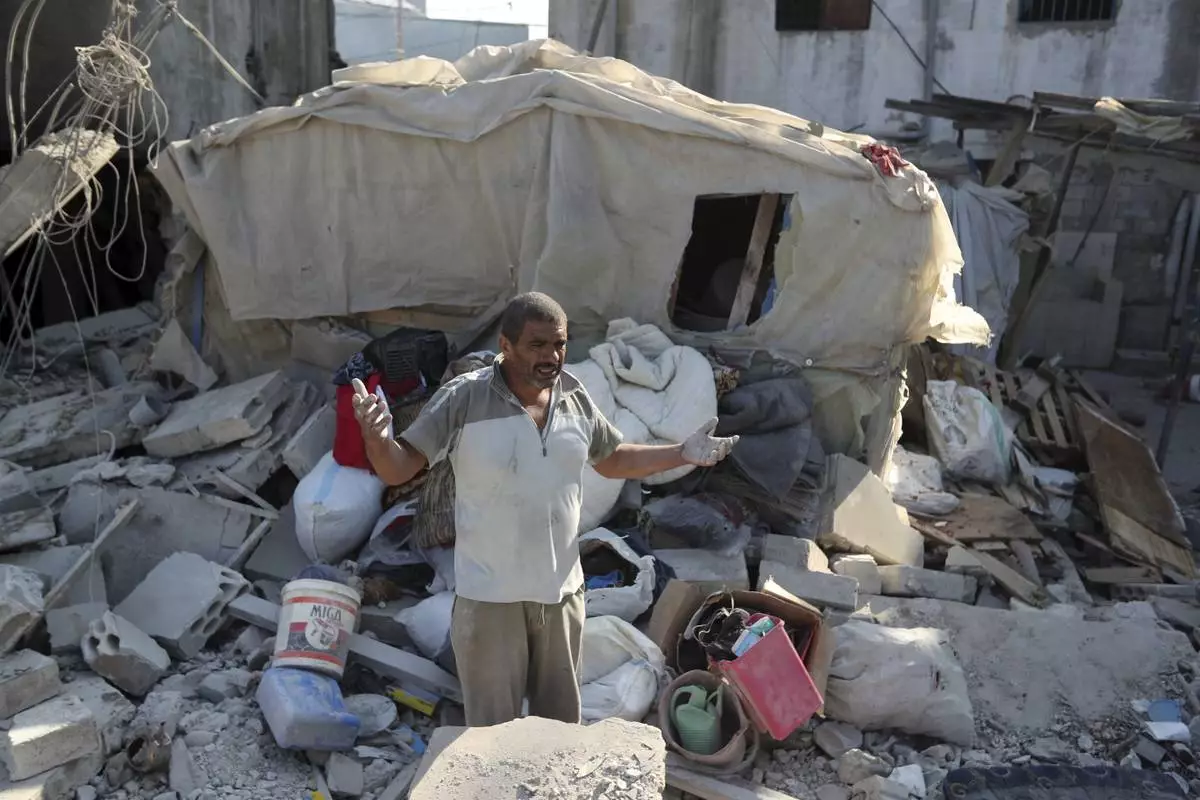
A man reacts as he stands on the rubble of a building hit in an Israeli airstrike in the southern village of Akbieh, Lebanon, Tuesday, Sept. 24, 2024. (AP Photo/Mohammed Zaatari)
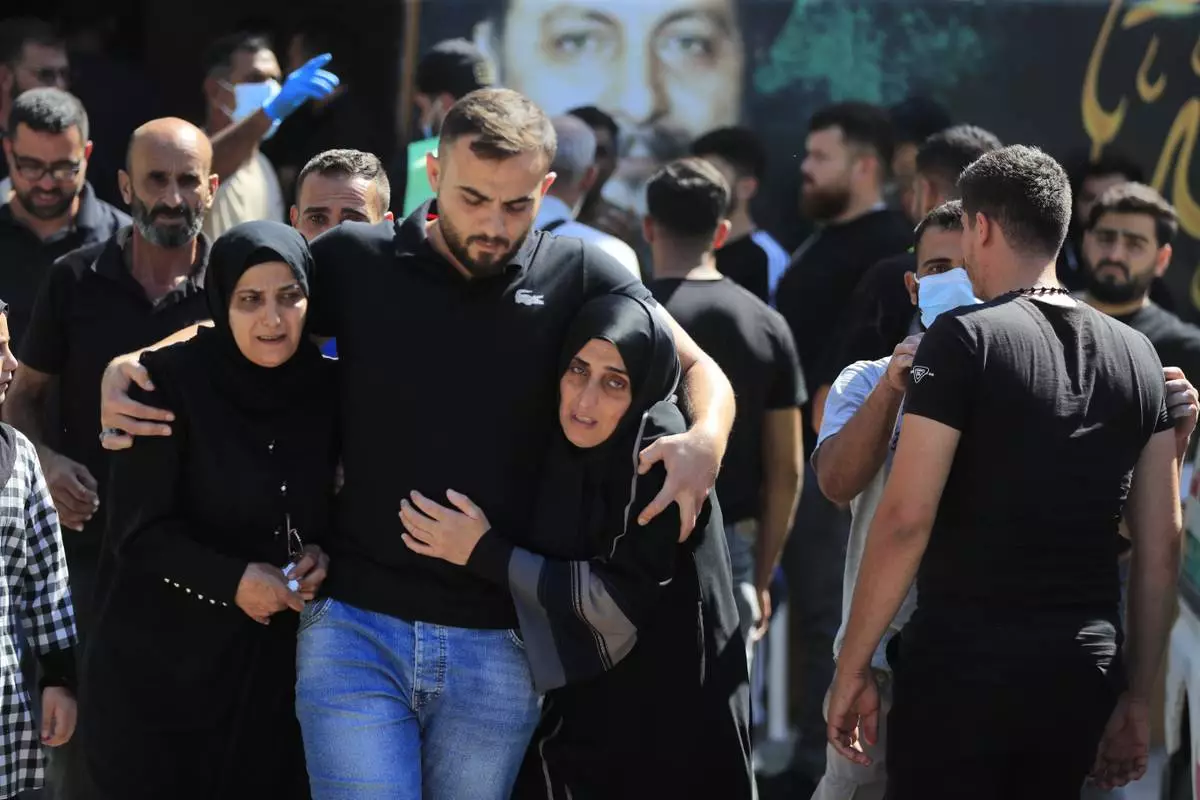
People react during the funeral procession of their relatives, who were killed in Monday's Israeli airstrikes, in the southern village of Saksakieh, Lebanon, Tuesday, Sept. 24, 2024. (AP Photo/Mohammed Zaatari)
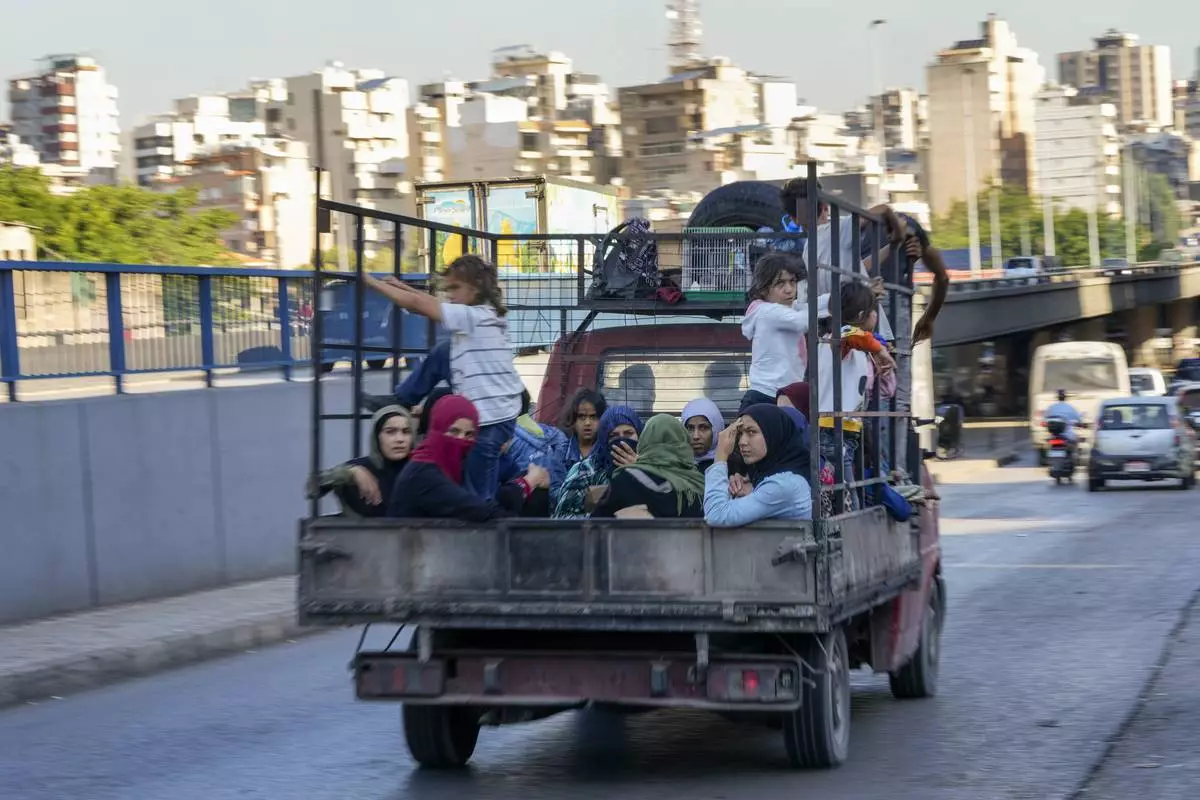
Lebanese citizens who fled from the southern villages amid ongoing Israeli airstrikes Monday, sit in a pickup in Beirut, Tuesday, Sept. 24, 2024. (AP Photo/Hassan Ammar)
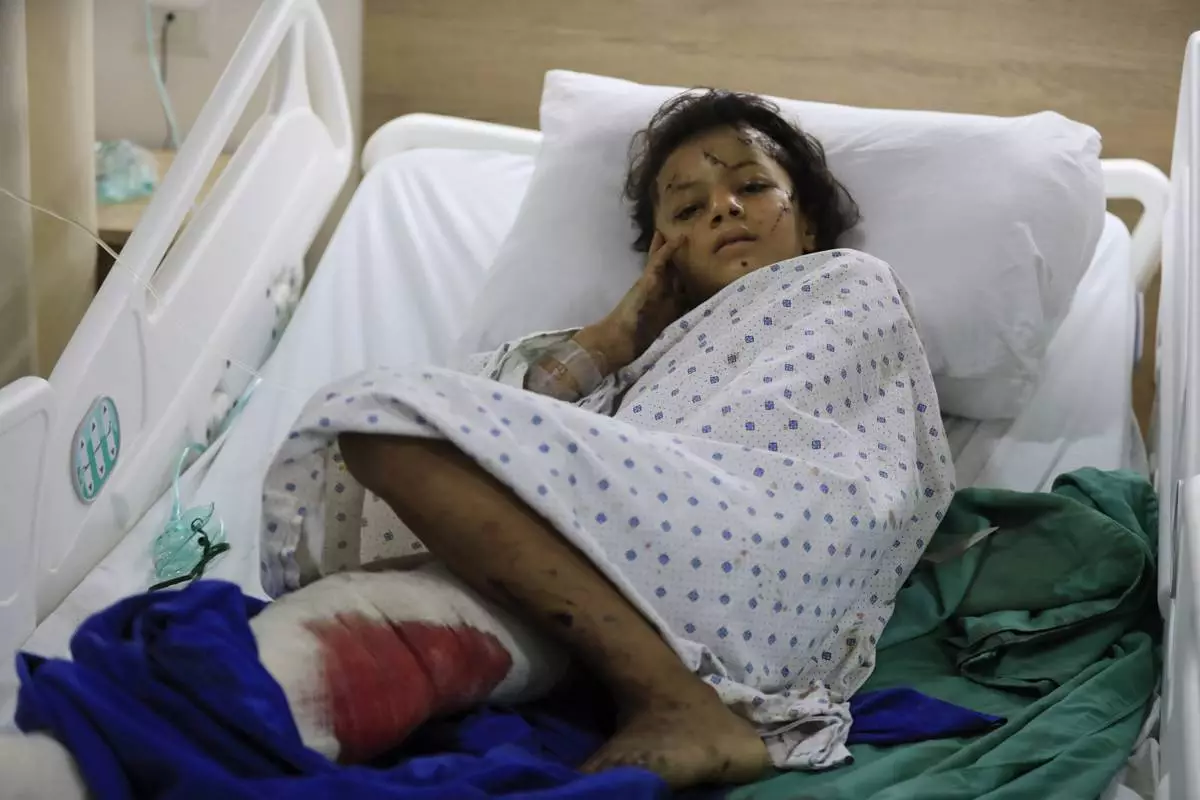
A wounded girl lies in a hospital bed in the southern village of Saksakieh, Lebanon, Tuesday, Sept. 24, 2024. (AP Photo/Mohammed Zaatari)
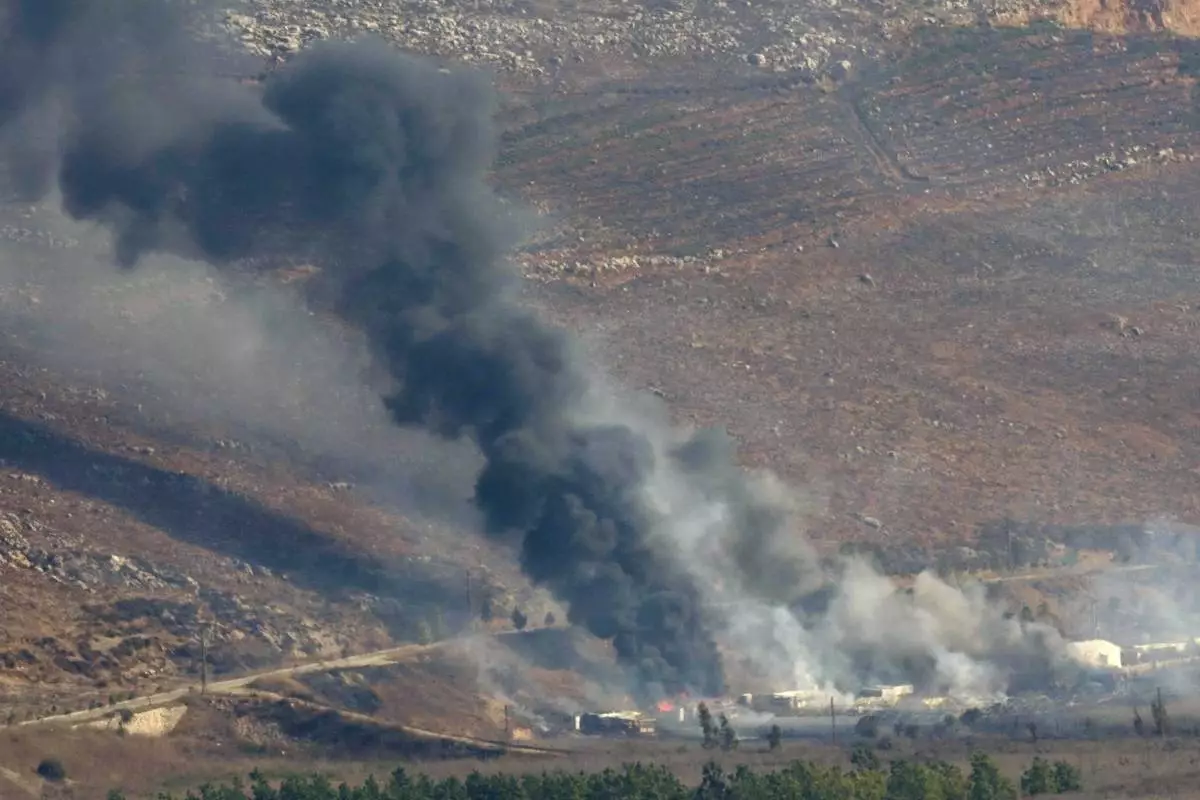
Flame and smoke rise from an Israeli airstrike in the Khiam valley, as seen from Marjayoun town, south Lebanon, Tuesday, Sept. 24, 2024. (AP Photo/Hussein Malla)
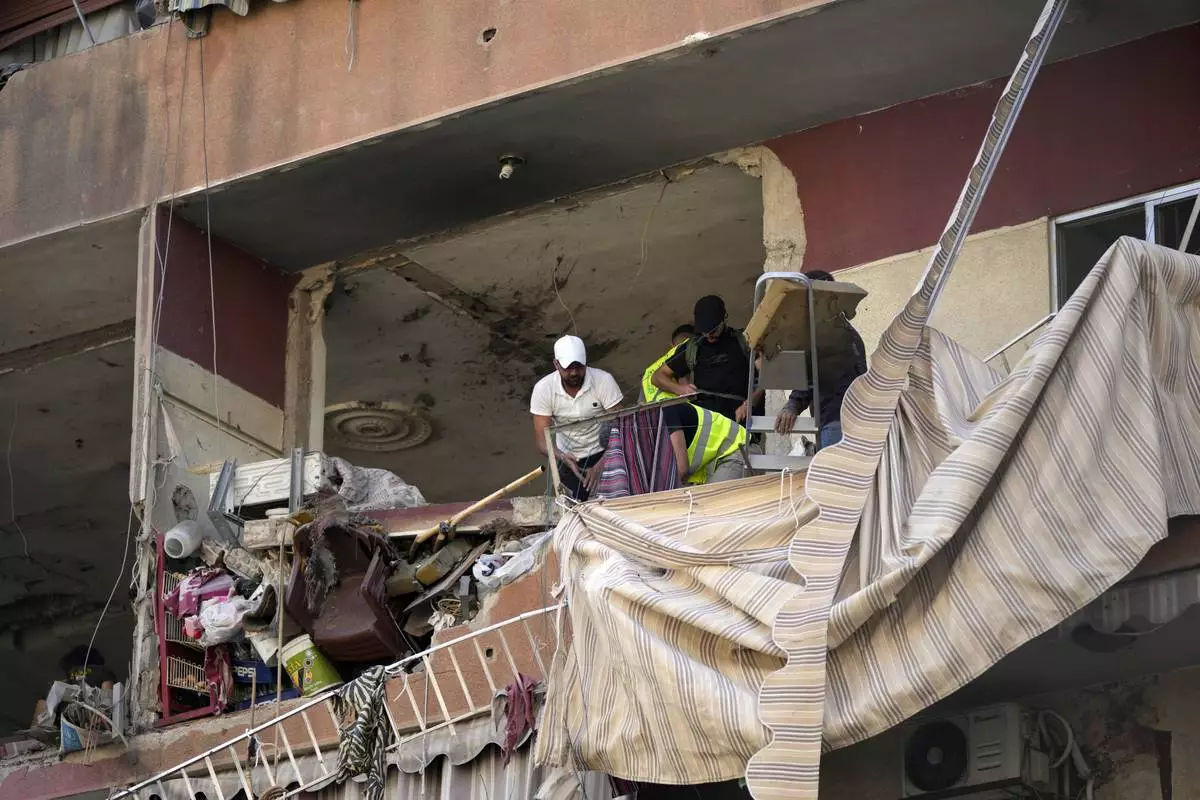
Residents and rescuers check a building that was hit by an Israeli airstrike in Beirut's southern suburbs, Tuesday, Sept. 24, 2024. (AP Photo/Hassan Ammar)
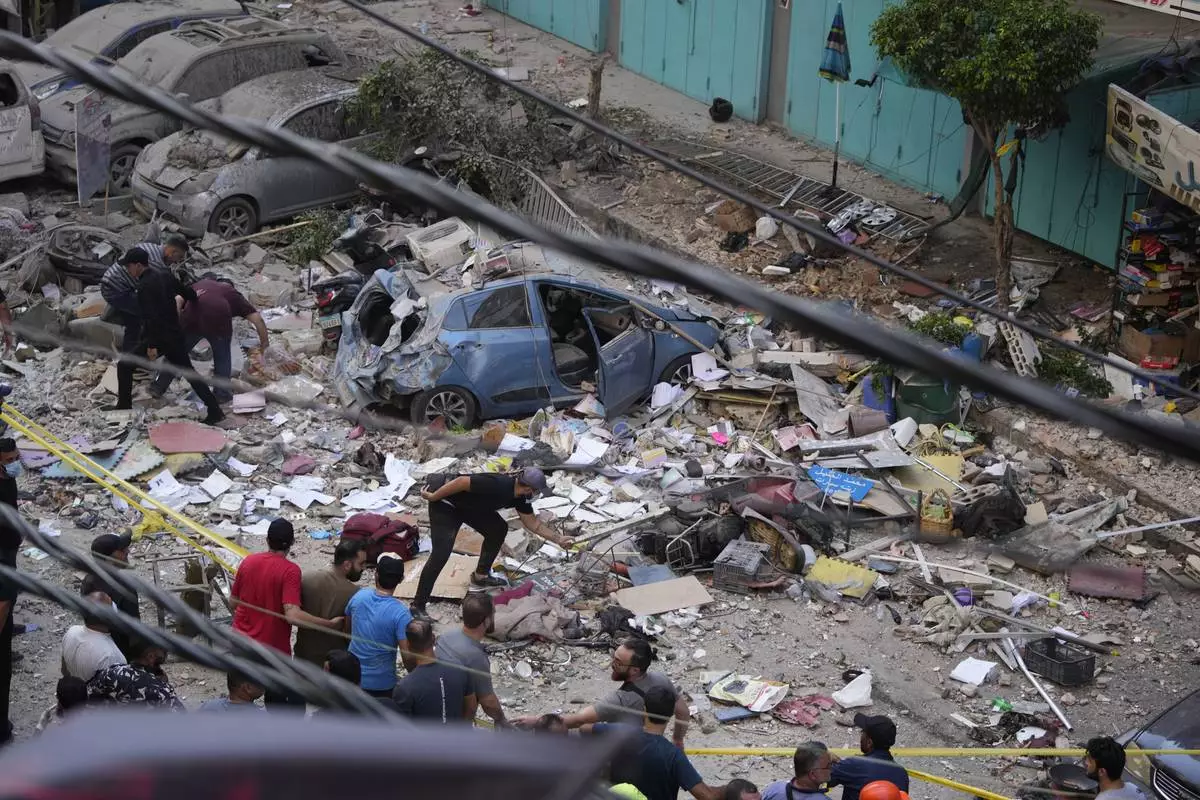
Residents check the site of an Israeli airstrike in Beirut's southern suburbs, Tuesday, Sept. 24, 2024. (AP Photo/Hassan Ammar)
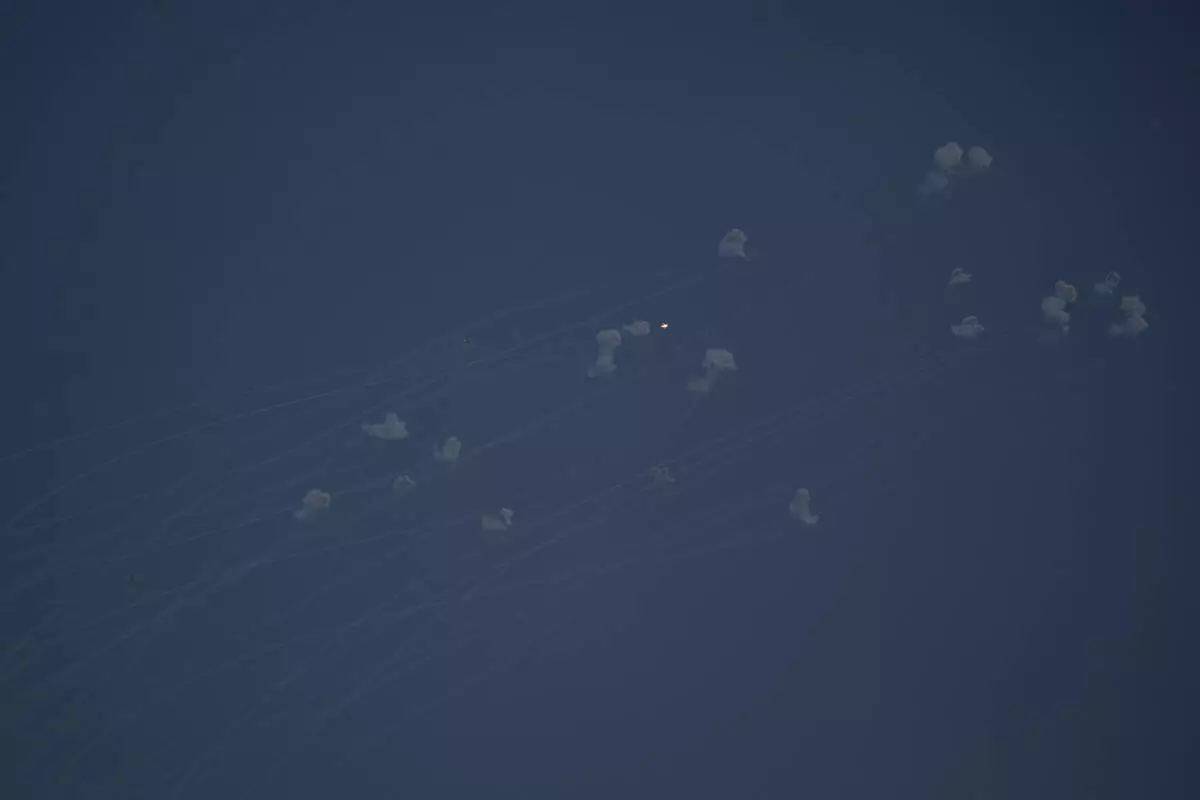
Israeli Iron Dome air defense system fires to intercept rockets that were launched from Lebanon, in northern Israel, Tuesday, Sept. 24, 2024. (AP Photo/Leo Correa)

A wounded girl lies in a hospital bed in the southern village of Saksakieh, Lebanon, Tuesday, Sept. 24, 2024. (AP Photo/Mohammed Zaatari)
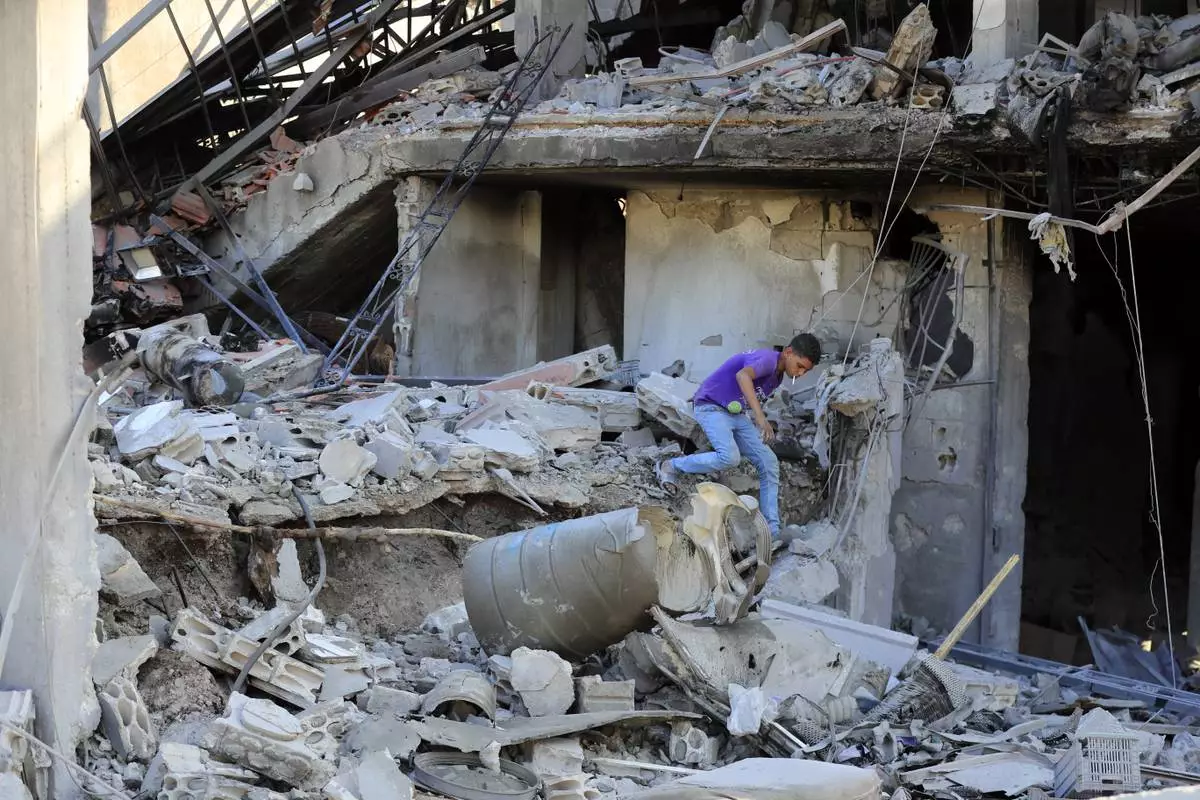
A boy checks the damage to a building hit in an Israeli airstrike in the southern village of Akbieh, Lebanon, Tuesday, Sept. 24, 2024. (AP Photo/Mohammed Zaatari)
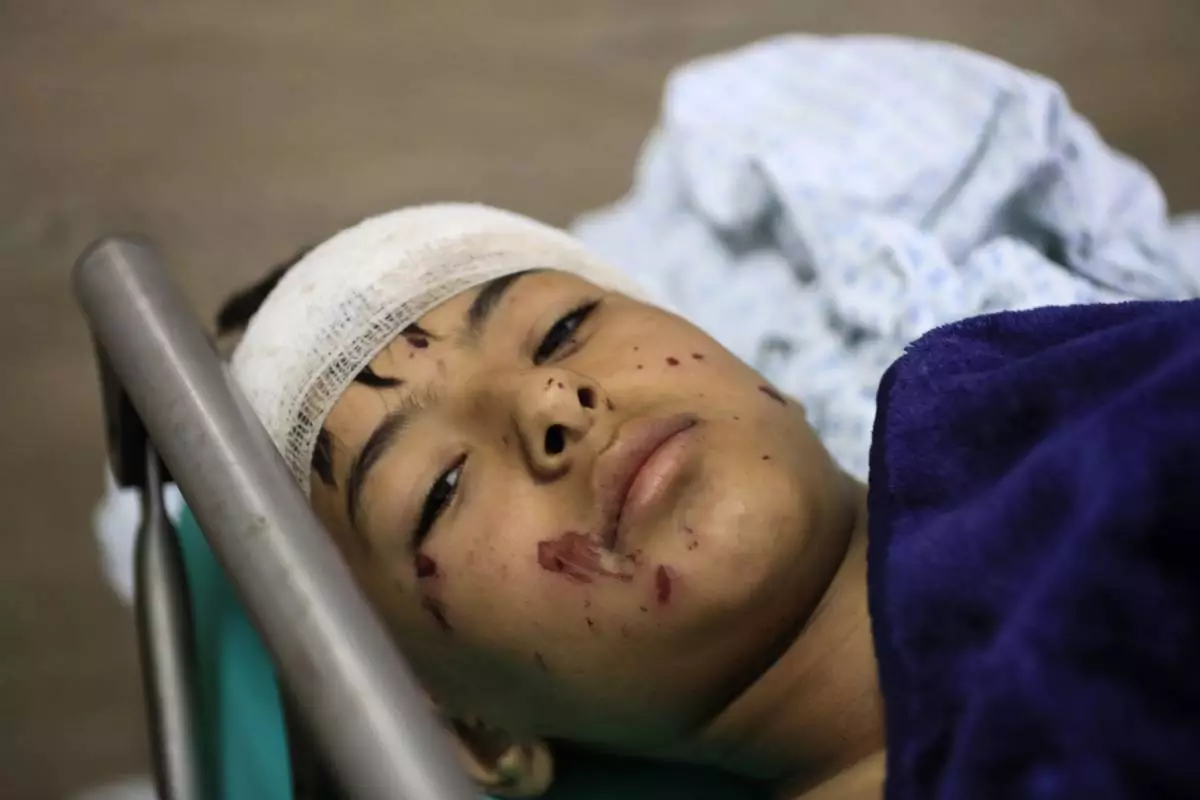
A wounded boy lies in a hospital bed in the southern village of Saksakieh, Lebanon, Tuesday, Sept. 24, 2024. (AP Photo/Mohammed Zaatari)
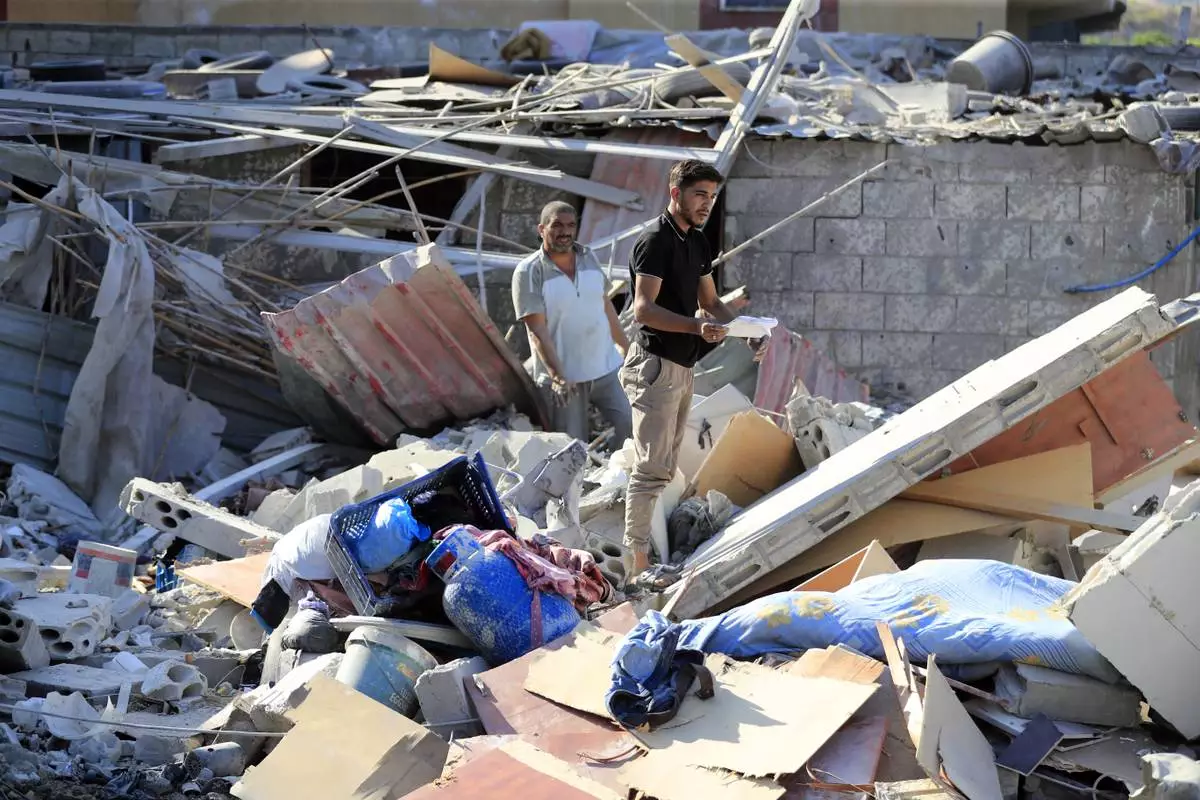
Men stand on the rubble of a building hit in an Israeli airstrike in the southern village of Akbieh, Lebanon, Tuesday, Sept. 24, 2024. (AP Photo/Mohammed Zaatari)
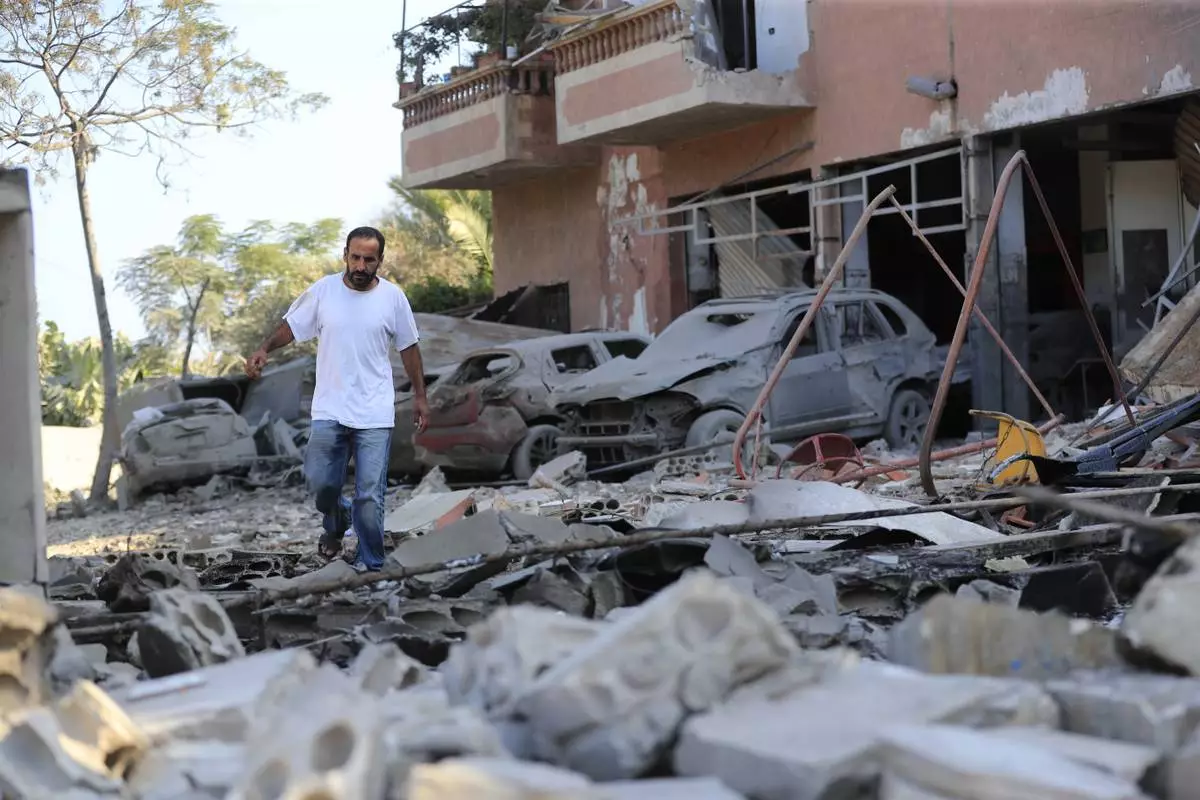
A man checks the damage to a building hit in an Israeli airstrike in the southern village of Akbieh, Lebanon, Tuesday, Sept. 24, 2024. (AP Photo/Mohammed Zaatari)
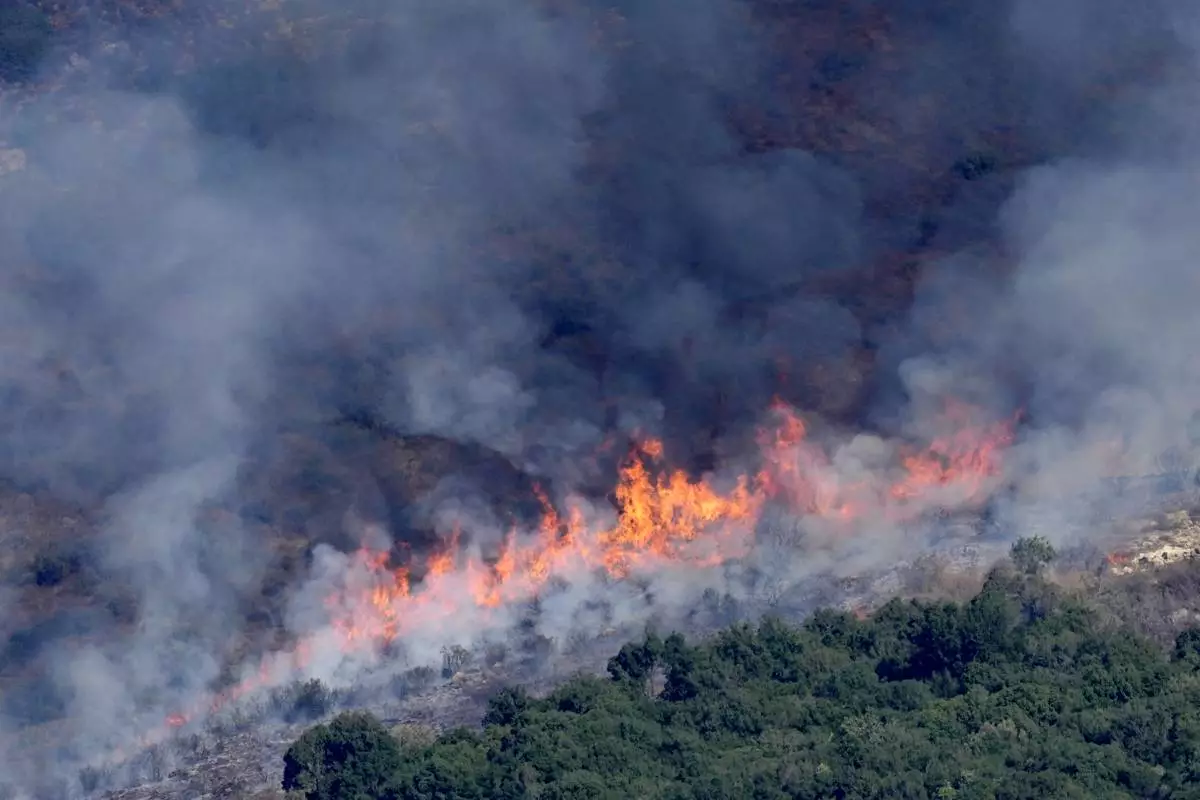
Flames and smoke rise from an Israeli airstrike on the Mahmoudieh mountain, as seen from Marjayoun town, south Lebanon, Tuesday, Sept. 24, 2024. (AP Photo/Hussein Malla)

A wounded girl lies in a hospital bed in the southern village of Saksakieh, Lebanon, Tuesday, Sept. 24, 2024. (AP Photo/Mohammed Zaatari)
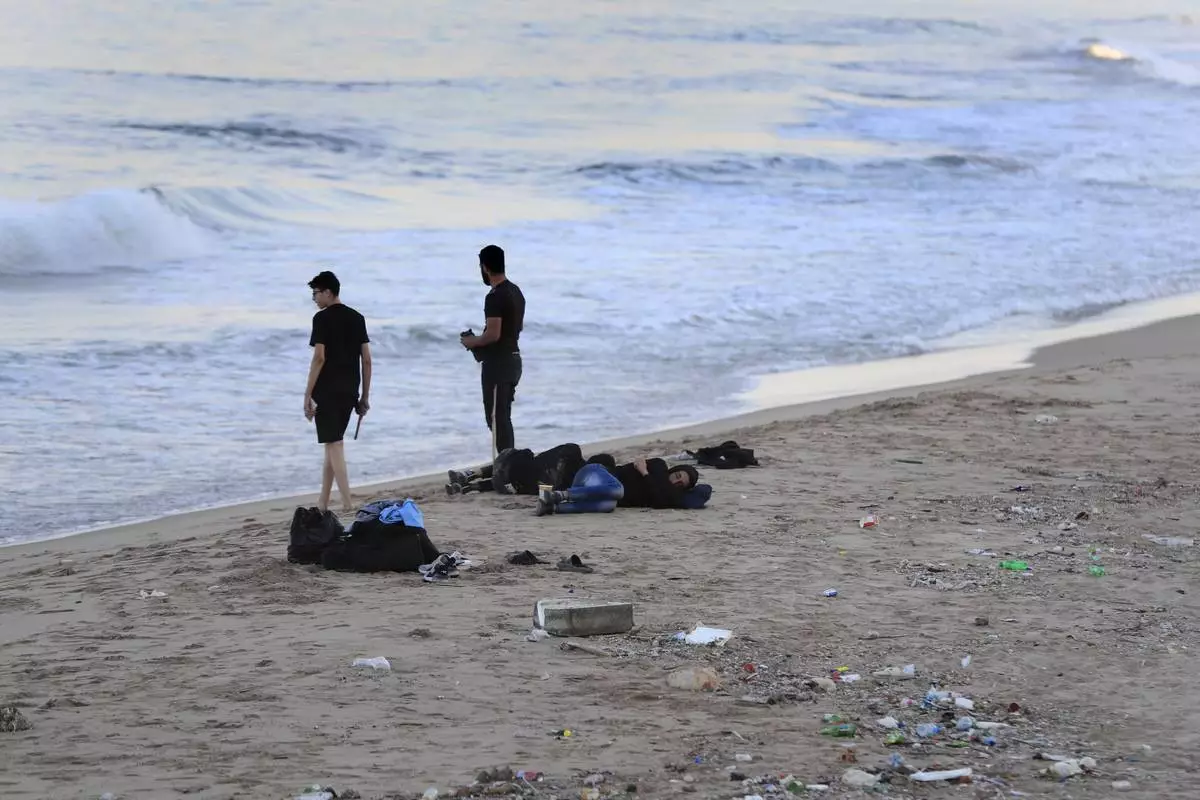
Lebanese men who fled on the southern villages amid ongoing Israeli airstrikes Monday, sleep on a public beach in the southern port city of Sidon, Lebanon, Tuesday, Sept. 24, 2024. (AP Photo/Mohammed Zaatari)
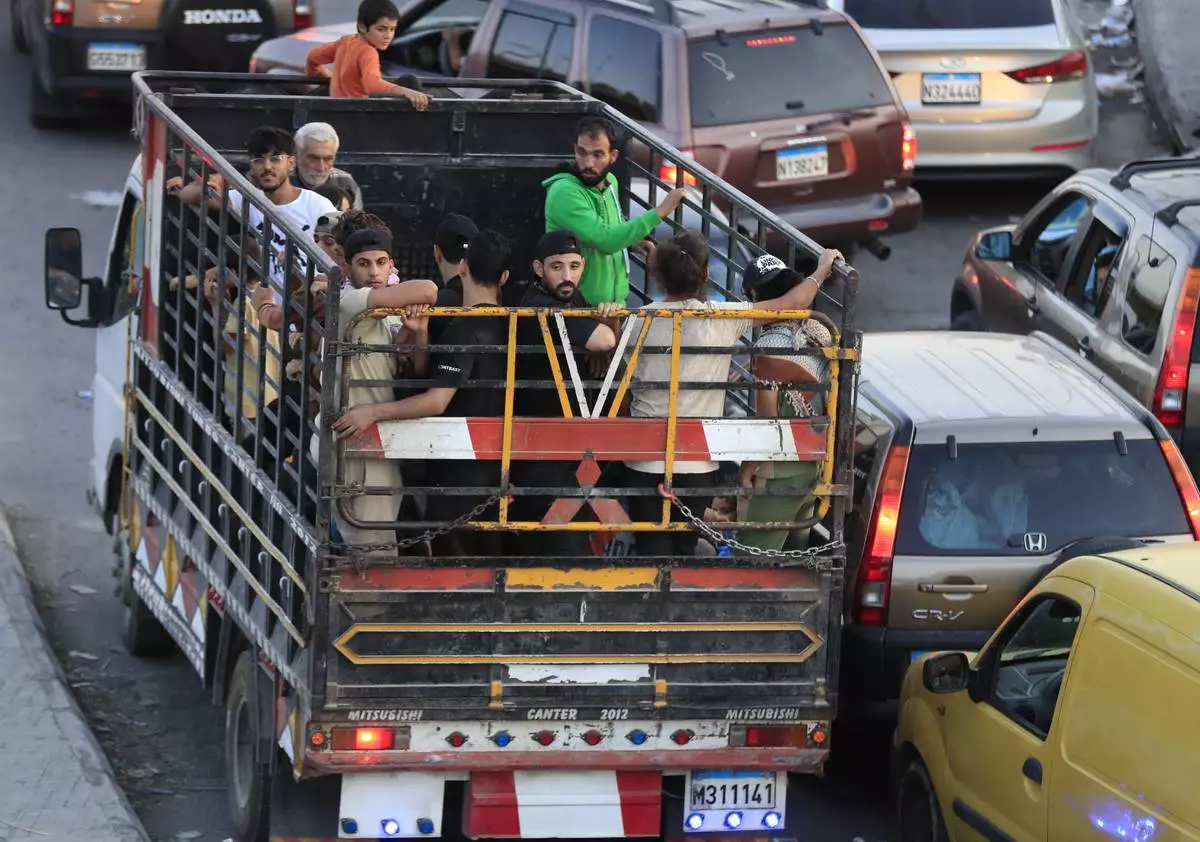
Lebanese citizens who fled on he southern villages amid ongoing Israeli airstrikes Monday, stand on a pickup at a highway that links to Beirut city, in the southern port city of Sidon, Lebanon, Tuesday, Sept. 24, 2024. (AP Photo/Mohammed Zaatari)
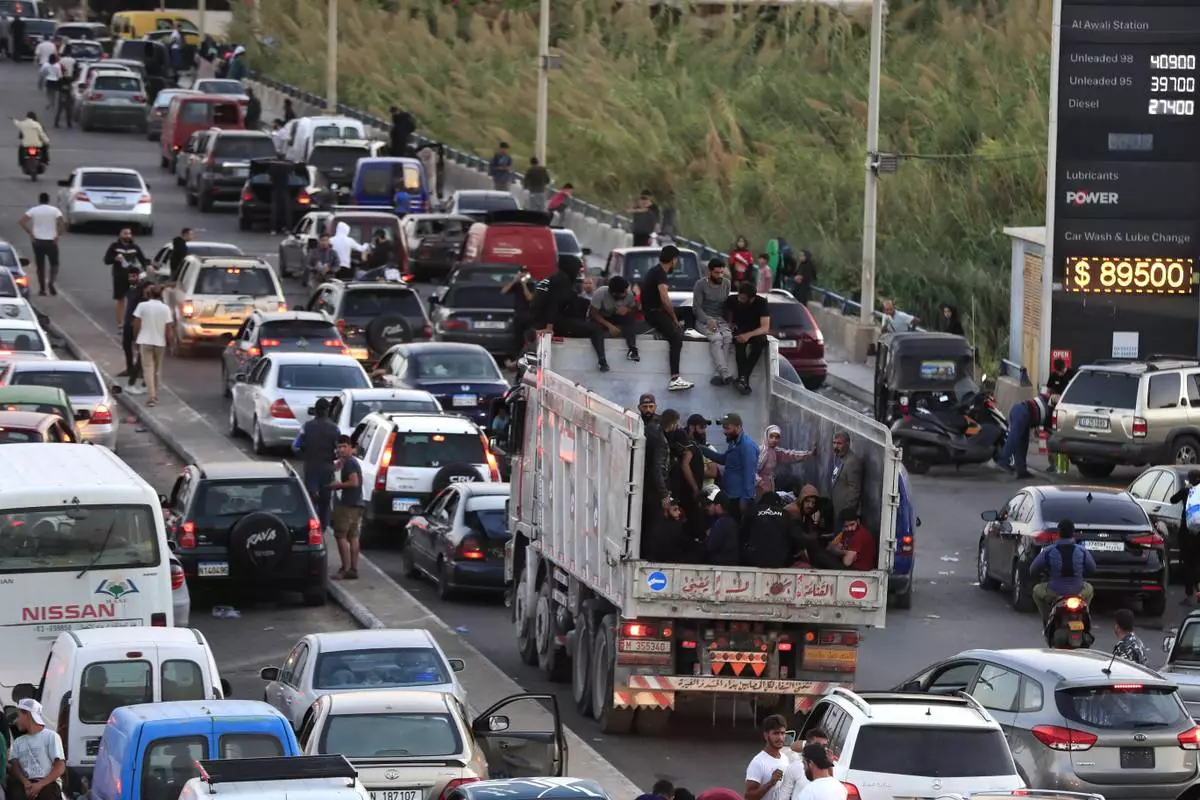
Lebanese citizens who fled on the southern villages amid ongoing Israeli airstrikes Monday, sit on their cars at a highway that links to Beirut city, in the southern port city of Sidon, Lebanon, Tuesday, Sept. 24, 2024. (AP Photo/Mohammed Zaatari)
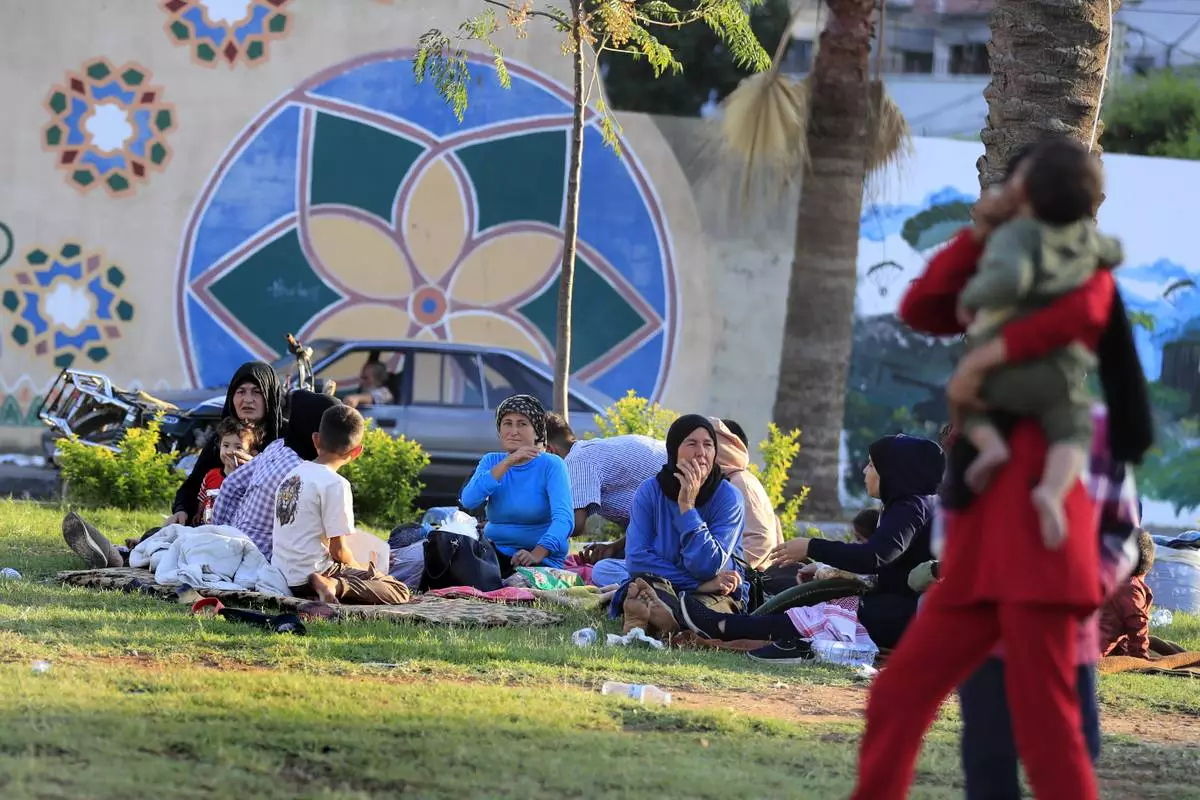
Lebanese citizens who fled the southern villages amid ongoing Israeli airstrikes Monday, sit at a park in the southern port city of Sidon, Lebanon, Tuesday, Sept. 24, 2024. (AP Photo/Mohammed Zaatari)
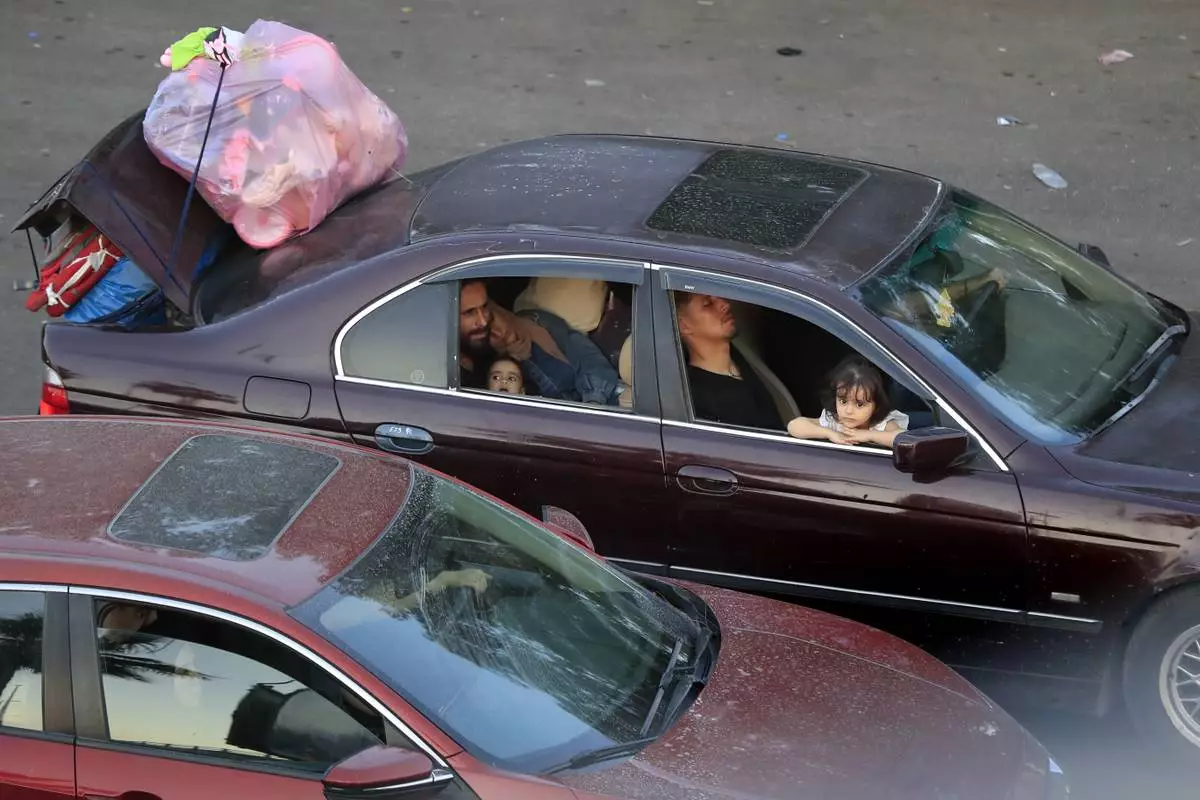
Lebanese citizens who fled the southern villages amid ongoing Israeli airstrikes Monday, sit in their cars at a highway that links to Beirut city, in the southern port city of Sidon, Lebanon, Tuesday, Sept. 24, 2024. (AP Photo/Mohammed Zaatari)
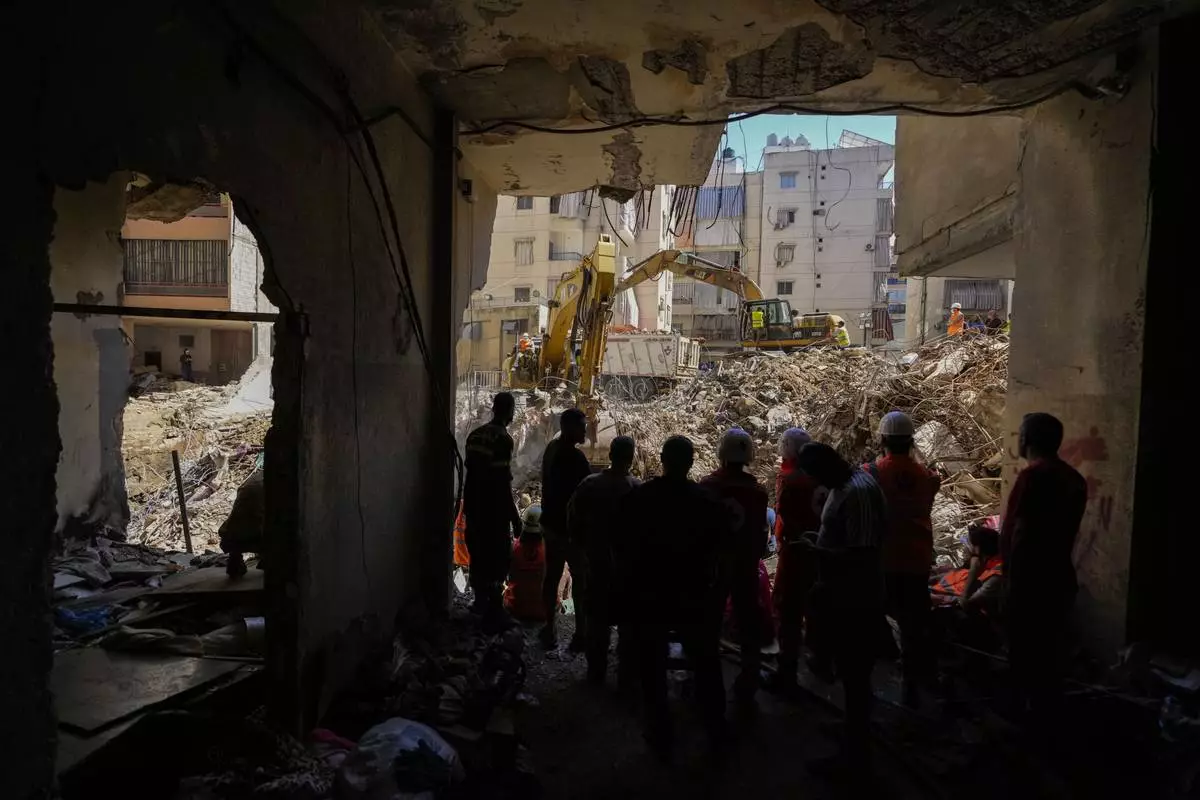
Emergency workers use excavators to clear the rubble at the site of Friday's Israeli strike in Beirut's southern suburbs, Lebanon, Monday, Sept. 23, 2024. (AP Photo/Hassan Ammar)
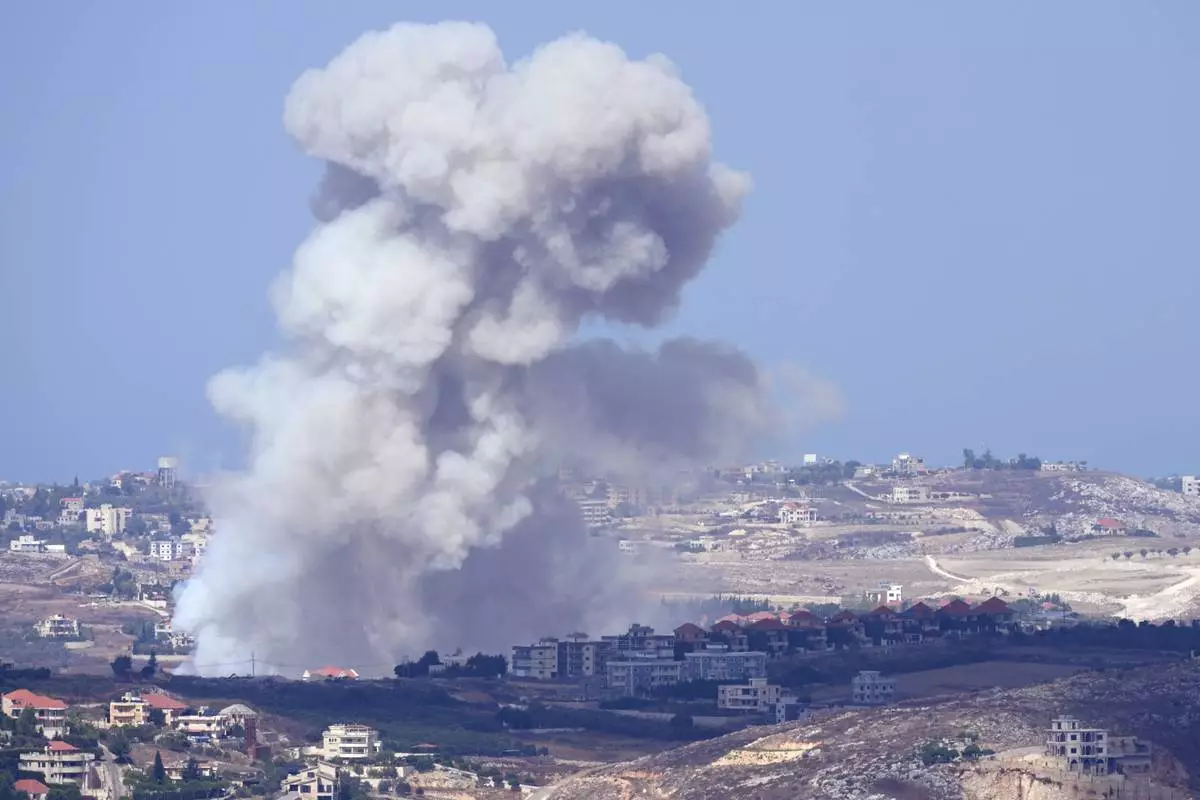
Smoke rises from Israeli airstrikes on villages in the Nabatiyeh district, seen from the southern town of Marjayoun, Lebanon, Monday, Sept. 23, 2024.(AP Photo/Hussein Malla)
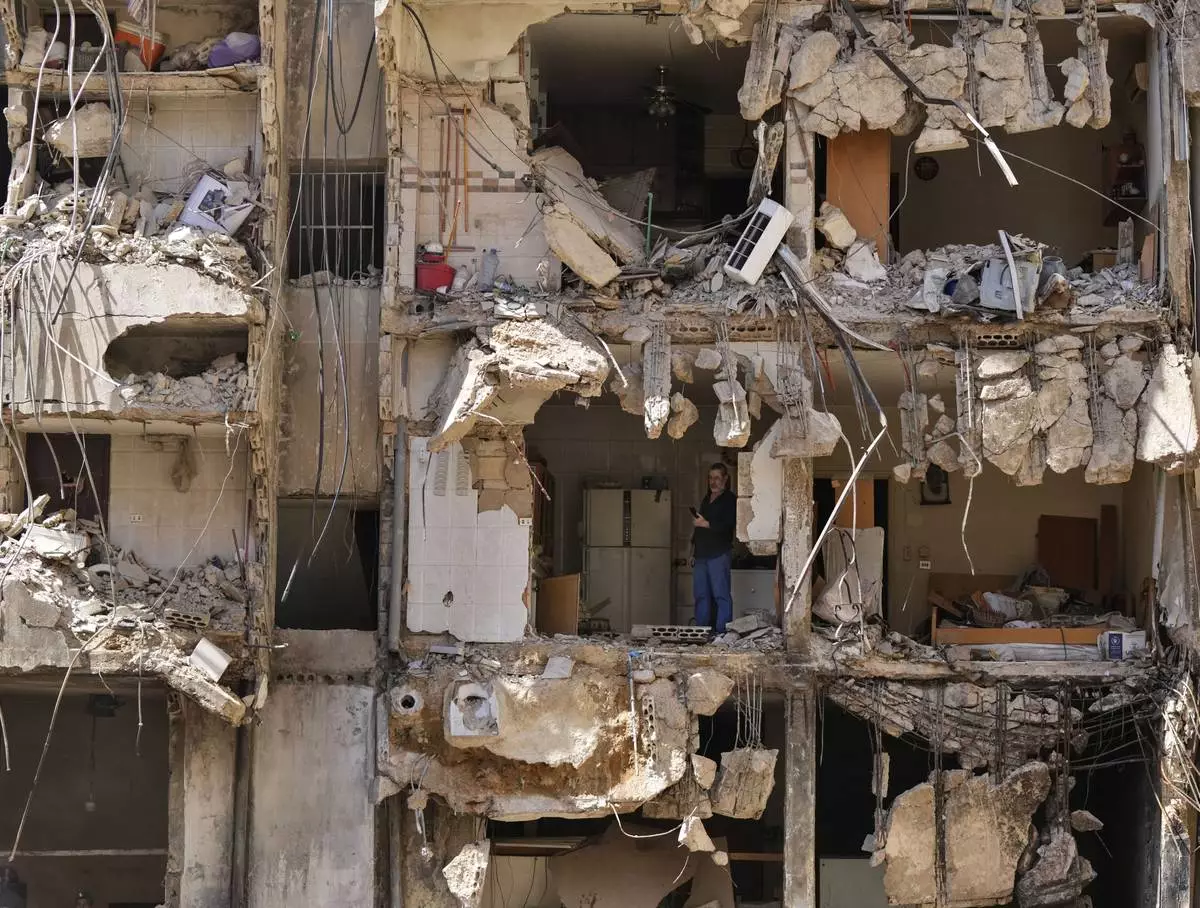
A man watches rescuers sift through the rubble as they search for people still missing at the site of Friday's Israeli strike in Beirut's southern suburbs, Monday, Sept. 23, 2024. (AP Photo/Hassan Ammar)
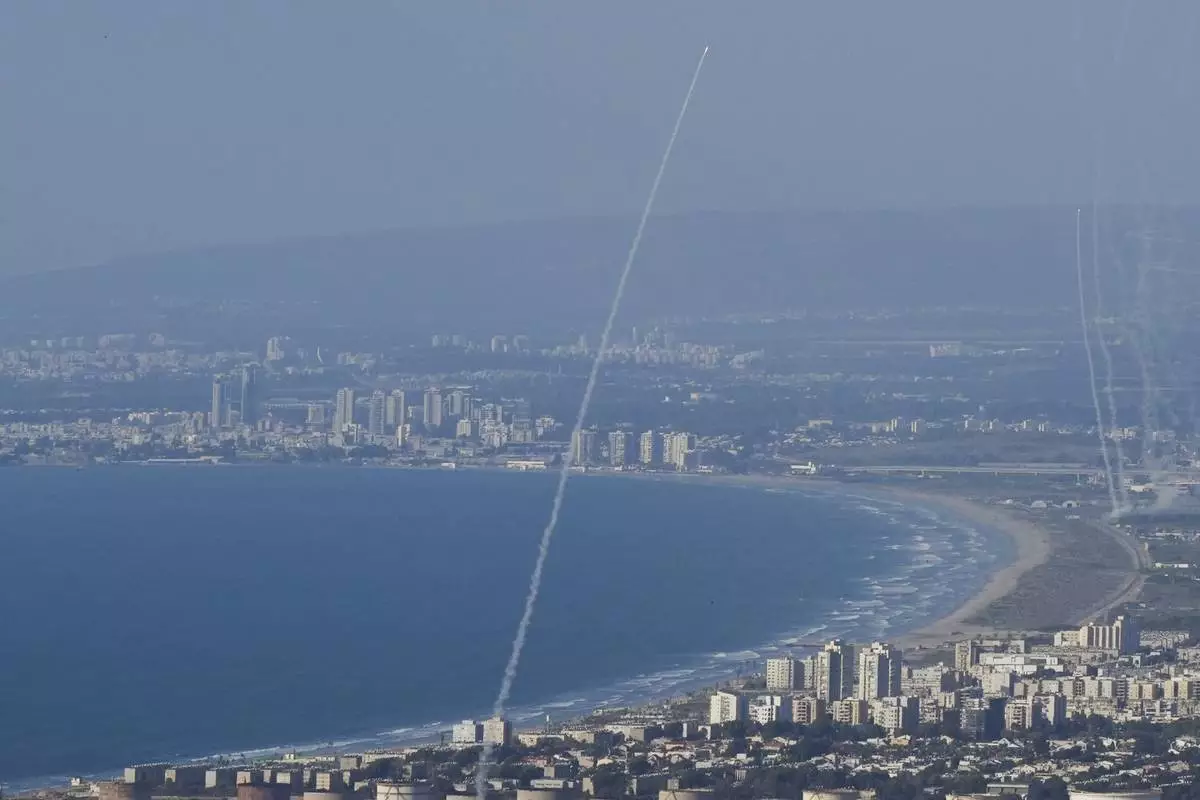
Israeli Iron Dome air defense system fires to intercept rockets that were launched from Lebanon, in northern Israel, Monday, Sept. 23, 2024. (AP Photo/Baz Ratner)
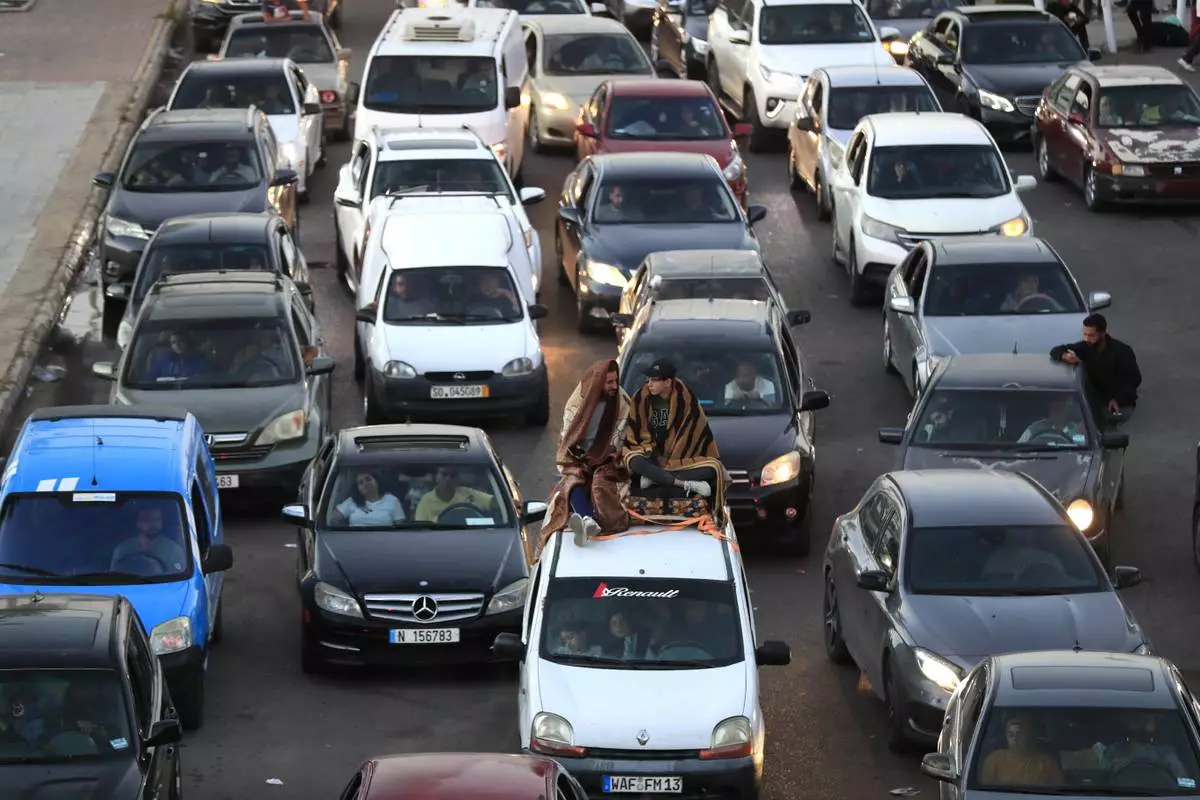
Lebanese citizens who fled the southern villages amid ongoing Israeli airstrikes Monday, sit on their cars at a highway that links to Beirut city, in the southern port city of Sidon, Lebanon, Tuesday, Sept. 24, 2024. (AP Photo/Mohammed Zaatari)
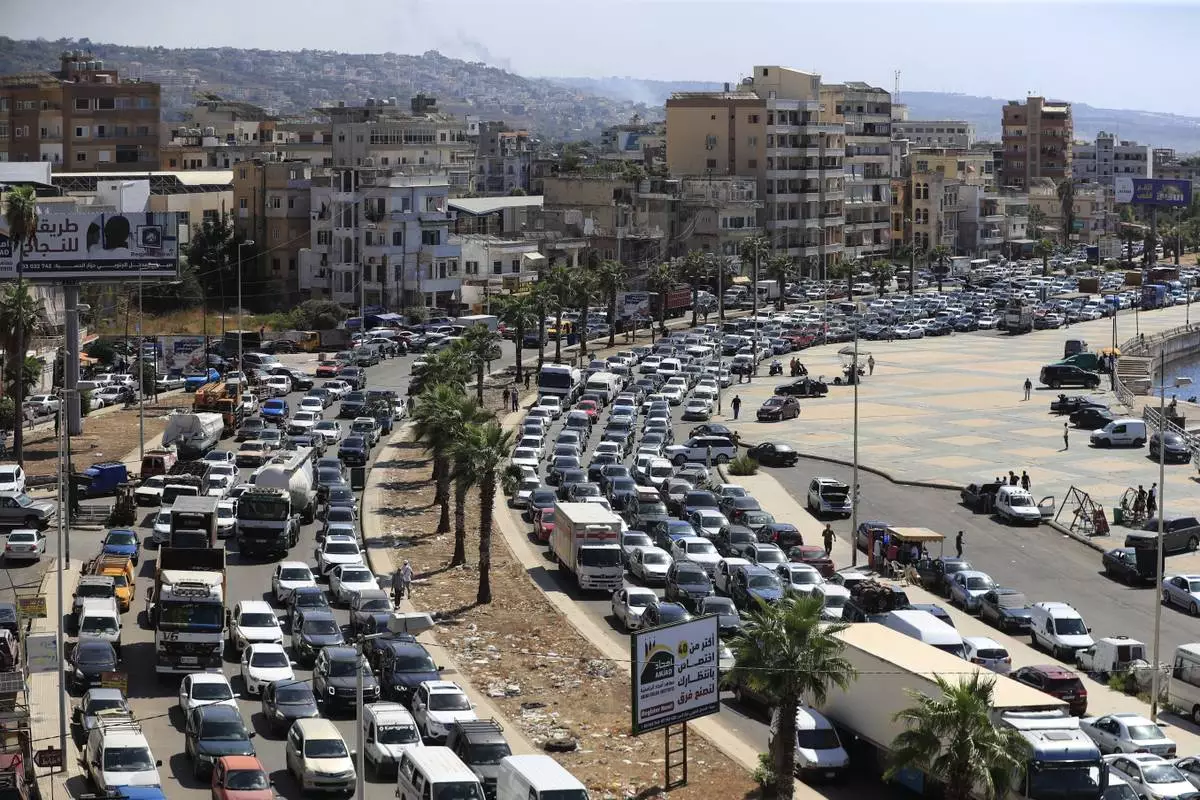
Cars sit in traffic as they flee the southern villages amid ongoing Israeli airstrikes, in Sidon, Lebanon, Monday, Sept. 23, 2024. (AP Photo/Mohammed Zaatari)
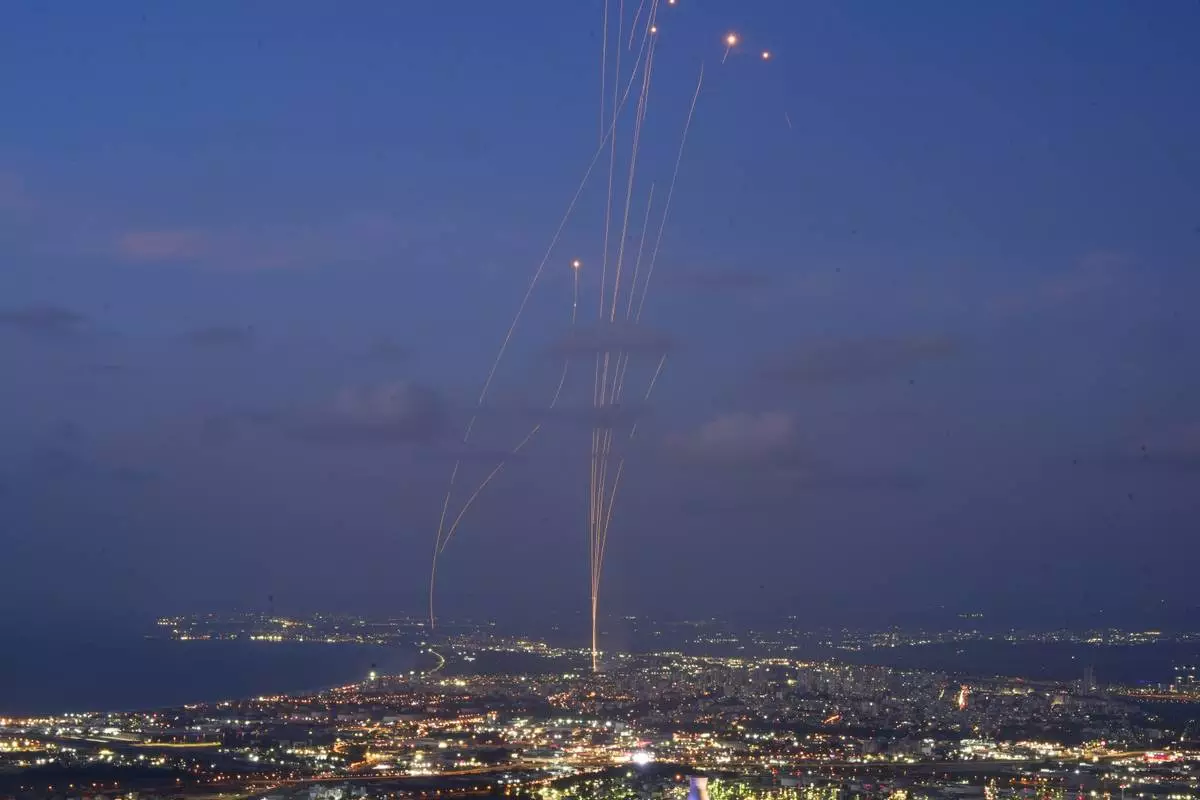
Israeli Iron Dome air defense system fires to intercept rockets that were launched from Lebanon, as seen from Haifa, northern Israel, Monday, Sept. 23, 2024. (AP Photo/Baz Ratner)
































